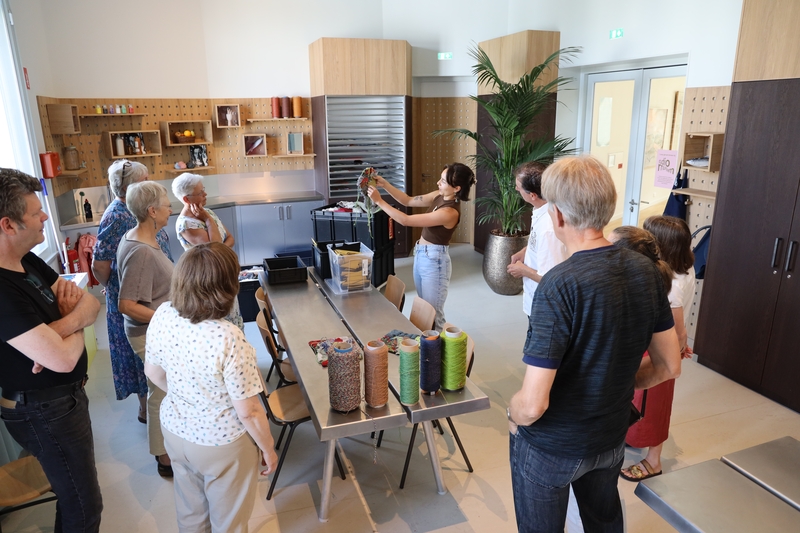Setting prices and beating impostor syndrome with Susie Jackson
Written by Justa Hopma
Sometimes you realise within the blink of an eye that someone understands you perfectly, even without having shared much of yourself. That’s the feeling I had when Susie Jackson answered a question of mine in her recent online workshop on setting prices. The workshop delved into the factors that freelancers should take into account when setting prices and was well-attended by SENSE members.
Now what was my question you might ask? I don’t remember it verbatim, but it concerned my first-ever paid blogging gig. Through participating in a workshop at my co-working space in Deventer, I had landed a paid writing assignment. As I was also working as a consultant, I hadn’t planned on working on a writing assignment. But it came about through a wonderful interaction with people I now call my friends. I think many freelancers will recognise this setting.
I had shared with Susie that I felt lucky to have the opportunity to write the blog, combining my love for writing and my PhD background in the political dimension of food and agriculture. And while that’s all very true, I will repeat this: I felt lucky to be able to write a blog on topics that I am beyond qualified to write about. Perhaps it comes as no surprise to you that Susie immediately ‘diagnosed’ me with impostor syndrome, but for those less familiar with the term: let me explain.
Impostor syndrome is generally considered as a collection of feelings of inadequacy. Future Learn offers a succinct yet comprehensive definition: ‘An internal experience and thought process believing that you are not as competent as others perceive you to be. It can affect anyone, no matter their social status, work background, skill set or expertise’. According to Psychology Today, it is more prevalent among women than men.
As you can imagine, experiencing impostor syndrome or its associated feelings has an impact. SENSE chair Sally Hill has written about this on the SENSE blog previously. What made Susie’s workshop so useful is that she connected underlying reasons and drivers to the process of setting prices, which is sometimes done without much critical reflection, following industry averages. If we don’t take time to stop and check, the emotions connected to a wider feeling of being out of place or performing above one’s level – even though misplaced – can have a direct impact on income.
For those who want to know more, you can follow the embedded links above and read Susie’s own blog about the topic, which contains many practical tips.
|
Blog post by: Justa Hopma Website: justahopma.com LinkedIn: justa-hopma Instagram: @justaschrijft |
[Image credit: slon.pics]

John Lennon allegedly once said that life is what happens while you are busy making other plans. I suppose Mr Lennon was not thinking about lunch in particular, but it nevertheless seemed to apply to the Southern SIG lunch on 8 September 2022.
The conveners had originally planned to have two lunch events. Unfortunately, the first one had to be cancelled and the second one had to be unexpectedly relocated at fairly short notice. In the end, Southern SIG welcomed a grand total of four attendees to Maastricht.
Although it would have been nice to see more people, we had a wonderful time catching up and greatly appreciated the complimentary lunch, with a special mention to the carrot cake. Moreover, the upside of a modest gathering is that you can have a proper conversation with everyone present.
Before diving into the meeting’s topic of networking, we had a lovely chat about a vast array of subjects. Did you know, for instance, that one does not become a volunteer tour guide at the Victoria & Albert Museum overnight? In fact, new recruits have to start in the cloakroom and then work their way up the ranks before they are entrusted with the great responsibility of taking tourists around the museum!
We then discussed the importance of small talk. We shared a real-life example of a co-worker who never uttered a word, save for ‘good morning’ and ‘goodbye.’ It turned out the gentleman in question was not unwilling to strike up a conversation but did not know what to talk about. It would seem this is an ailment mostly suffered by men, although the cure is surprisingly simple – just try asking someone a question. If you are the silent type, you could ask them how their journey to work was or if they have any plans for the weekend. Before you know it, you will be engaging in small talk.
We also discussed networking and how conferences can be beneficial for your freelance business. As a language professional, you have plenty of annual conferences to choose from, but you should keep in mind that attending one can be a significant expense. Travelling to the venue, booking a hotel, the conference ticket itself, fringe events, meals and entertainment can cost up to a thousand euros. That said, it is a great way to meet like-minded language professionals and conference-goers are usually the friendly, outgoing type. However, you will not typically meet your next big client at a translators’ or editors’ conference. If you want to meet clients, you should consider attending their industry conferences, not yours.
If you are knowledgeable about a particular subject, it could also be interesting to give a lecture or workshop about it. This way you can showcase your knowledge to peers and you will meet colleagues with similar interests or skills, which may be interesting for future collaborations.
In summary, it was a productive and pleasant lunch and Southern SIG hopes to host more in-person events in the future.
|
Blog post by: Jasper Pauwels LinkedIn: jasperpauwels |
Editing and proofreading – how to get it right
Written by Sally Hill
Karen McMillan Tkaczyk (mcmillantranslation.com) is a Scottish chemist-turned-linguist with a Polish surname living in Colorado. Ever since meeting Karen at a UK translation conference back in 2011, I have found this a fascinating combination. And given her extensive experience as a French-English translator and trainer, I was pleased to hear she’d agreed to give an online workshop for SENSE. This was held on 15 November 2022 for a group of more than 25 SENSE members.
Spot the deliberate mistake
During the 2-hour session, Karen shared her principles for proofreading and editing (our own work and that of others) but she also dealt with pricing, and dealing with emergencies and tight deadlines. Karen kept us on our toes with ‘spot the deliberate mistake’ quizzes in between her other slides and used the chat to ask for our input, which kept things nicely interactive. A topic such as proofreading and editing naturally requires definitions, and Karen clarified from the start that she sees editing basically the same as revision (making changes to a text), and proofreading the same as copy editing (correcting obvious mistakes or style guide discrepancies).
If in doubt, don’t!
She also touched on client communication – that we should make sure to tell the client beforehand what we’re going to do, to avoid surprises. And she encouraged us to be aware of the difference between an improvement and a personal preference, and between a correction and a suggestion; the take-home message being ‘if in doubt, don’t!’ When correcting the work of others, during quality control or translation revision, Karen emphasized the importance of critiquing the process rather than the person.
Dragon breath
We also discussed software and other tools of the trade to help us spot mistakes and inconsistencies, and several participants indicated that they would be trying out some of Karen’s suggestions, including Xbench (quality assurance software for translators) and PerfectIt (consistency checker in Word). One term that I’d not heard of before was ‘dragon breath’, which she used to refer to mistakes arising in a text due to speech recognition software such as Dragon NaturallySpeaking. Conversely, text-to-speech software can be useful for discovering mistakes in your text by when you listen rather than read.
Per word, per hour or per project?
In terms of pricing, Karen discussed the pros and cons of charging a word rate, hourly rate or project rate – she has found that many of her clients accept a flat fee per project. Such a strategy has the advantage of fast work benefiting the word-worker rather than the client, but this may involve some negotiation.
Resources
After the workshop, in addition to sharing her slides, Karen sent us some extra resources: a document explaining her quality assurance procedure for translation, her checklist for editing a manuscript for a journal, and a document listing the resources she had mentioned during the session plus many more – these included lists of software, style guides, websites and training courses.
Given the limited time, I felt that Karen covered a lot of material that was useful both to translators and editors, with many of her tips also applying to copywriters. I hope that next time she is in Europe she will be able to give an in-person workshop for SENSE.
|
Blog post by: Sally Hill LinkedIn: sally-hill-nl Twitter: SciTexts |

SENSE’s Training SIG convenor, Stephen Johnston, writes:
We held the first Training SIG meeting on Wednesday November 16 via Zoom. The topic was ‘The difference between teaching and training’. Participants included seasoned trainers and teachers, as well as the usual variety of language professionals from a wide range of fields.
It was a lively discussion, with most in agreement that while there is overlap between teaching and training, teaching is usually theoretical, focusing on increasing students’ understanding of a subject, while training is more concrete, focusing on increasing participants’ skill sets in a professional setting.
We agreed that training also involves shorter speaking segments combined with plenty of hands-on exercises, usually given in one or two-day sessions as opposed to longer series of lectures across weeks or months.
One surprise did pop up: the addition of the idea of ‘coaching’, which led to interesting discussions about a series of single participant sessions instead of a group approach.
The fact that we had experienced trainers as well as those curious about moving into the field ensured that there were plenty of questions, which kept the conversation going easily.
The Training SIG will be meeting about 3-4 times a year, so stay tuned for upcoming sessions that will focus on issues such as:
• What makes a good workshop session?
• How do you pitch a workshop and negotiate a price?
• What do corporate businesses want? (with a guest speaker)
• What do educational organizations want? (with a guest speaker)
• What are the current and future trends in training (blended learning, etc.)?
• What’s the difference between ‘business English’ and ‘business writing’?
• What are ‘storytelling for business’ workshops?
If you're interested in future meetings of the Training SIG, please contact Stephen Johnston, or visit SENSE’s Events page for news of other meetings.
[stock photo: Unsplash]
UniSIG Report: Artificial Intelligence with Writefull
Written by Adam Frick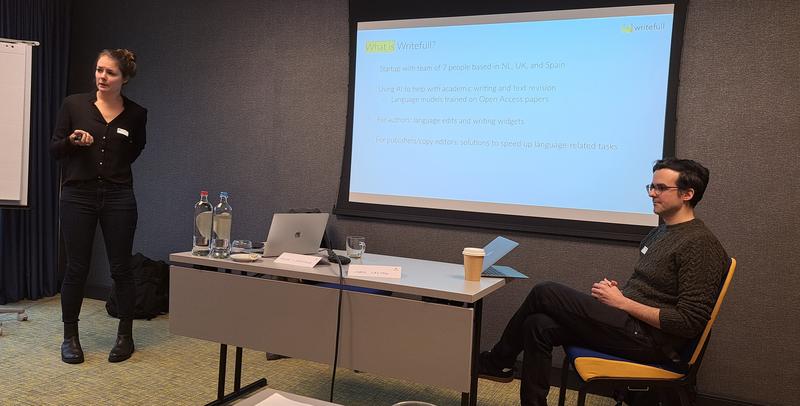
At the 11 November 2022 UniSIG meeting, 12 SENSE members met at Park Plaza Hotel in Utrecht to hear about Writefull from Dr Juan Castro (CEO of Writefull) and Dr Hilde van Zeeland (Chief Applied Linguist). Their presentation focused on the use of artificial intelligence (AI) to revise academic texts, as well as what Writefull can offer SENSE members as an AI-based editing tool.
Writefull’s team consists of seven people based in the Netherlands, the United Kingdom and Spain. According to Juan and Hilde, the software uses language models constructed using hundreds of millions of sentences derived from open-access papers, mainly in the field of bioscience, in order to provide solutions to speed up language-related tasks. Writefull uses natural language processing (NLP) to identify aberrations in typical English sentence constructions (length, word order, word choice, formal/informal, language accuracy and language use). Writefull began as a tool for students and researchers as a means of overcoming language barriers, and it is now used by several editing companies and publishers.
During the presentation, AI was discussed in terms of its merits, but it was also dissected and challenged. Not all editing tools are alike, of course, as PerfectIt, Grammarly, Trinka and others show, and some are more effective than others. We discussed how AI-based language editing may impact the individuality of writing styles.
The presenters noted that AI-based editing tools have uses in different tiers within the industry. For example, Writefull is currently used by publishers as a tool to streamline ‒ and perhaps reduce the need for ‒ human editing, thereby leading to lower overall overhead costs and opening a path to publication for many scholars with lower levels of English, such as Chinese-language authors. According to the Writefull team, their AI-based service can lead to lower immediate rejection rates, higher acceptance rates, quicker acceptance and fewer revision rounds for authors submitting a text to be published in a journal.
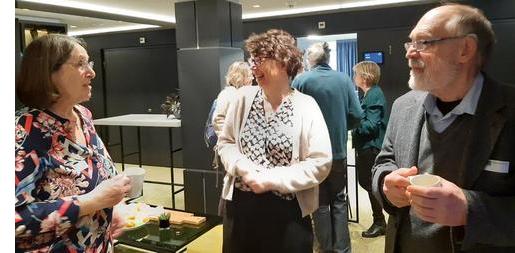
After the presentation, several of us had lunch with Juan and Hilde, where we continued to discuss the topic of AI and its increasingly prominent role in editing and translation. Writefull is just scratching the surface of the potential for AI-based writing tools. For example, the future of AI-based editing may include writing models tailored for specific professions; while this is not currently cost-effective, future versions of Writefull may diversify for user-specific writing tools.
UniSIG is grateful to Juan and Hilde for taking the time to show us what Writefull and AI-based editing tools can offer our members, and we look forward to future updates!
[Image: SENSE members Daphne Lees, Henriette Schoemaker and Charles Frink discussing what they’ve learnt.]
Utrecht SIG Report (9 November 2022): How do we translate?
Written by Anne Hodgkinson
A convivial group just shy of a dozen SENSE members met on Wednesday 9 November over Zoom to discuss the evening’s theme, ‘How do we translate?’. (Although it’s still called the Utrecht SIG, attendees hailed from all over the Netherlands, and one digital nomad is currently on the Isle of Man!) More specifically, do we plough through the translation quickly, creating a rough first draft, or do we have to get it perfect on the first go? Do we do research as we go along, or before we actually start translating? What tools do we use? And how many passes do we make before finalizing the translation?
Convener Jenny Zonneveld had been inspired by an interesting keynote talk at a translation conference involving three literary translators. The first had put up a screen shot of a typical first-draft paragraph for him, in which he had not only typed out several options for some words but also capitalized other words – and quite a few of them – that he would look up later. The second translator used to do this, but now starts by putting the entire text through DeepL to get a ’pre-translation’. He shared donut charts showing the percentage of time spent on various tasks using his old and new methods. His first draft used to take about 66% of the total translation time. DeepL reduced the first draft to 3% of the total translation time, with the rest divided between cleaning up the first version and a spell check. (He didn’t say whether this new method actually saves time overall or just redistributes the same amount of time over different activities, but we assume it does or he wouldn’t be using it.) The third translator uses MemoQ, working segment by segment and occasionally leaving a bit to look up later.
Those present at the Utrecht SIG meeting were a mixed bag as far as our approaches. Most of us use one or more computer-aided translation tools. Some of us don’t, as the texts we deal with aren’t helped by it, or because the potential for major mistakes is too great, eg, with legal texts, which one translator said have to refer specifically to Dutch law and have to be ultra-precise. Many of us post-edit machine translation (MT) texts. SENSE member Samuel Murray has posted on the forum about checking a list of names of medicines which the client had put through MT. Although it sounds pretty straightforward and certainly like a time-saver, the program had skipped bits and translated a number of names incorrectly. Out of curiosity, Samuel put it through Google Translate, which botched it in a different way.
Other tips and tricks we shared:
- Take time away from the job: We agreed that coming back to look at the first draft with a fresh pair of eyes is invaluable. However, we do not always have that luxury. One member said he normally has very tight deadlines, and by the time he’s finishing his first draft, his deadline is approaching.
- Have the right hardware: We had a brief discussion of mouses and even a vertical version called a Penguin (Fellowes makes it; your hand is turned vertically, which reduces wrist strain) which one member found extremely helpful.
Read your translation aloud: obviously you can’t do this for a whole book, but for short texts it’s useful for making sure you’ve got tone and rhythms right. - Dictate your translation using either your computer’s speech-to-text function or a separate program or online service. This can save time typing and reduce hand strain. It requires a different way of thinking about your text, however, and takes time to get used to.
All in all, we agreed that there are many roads to Rome, and that we all have different needs and limitations, and that whatever works for you is fine!

On 12 December 2022, Susie Jackson gave a workshop for SENSE on pricing and negotiating with confidence. During this online event, participants learnt what to consider and avoid when pricing their services and how to negotiate with clients who can’t afford to pay one’s rate.
We’re really excited about Susie sharing her knowledge and experience on this topic with us and hope it will help participants feel more confident about pricing their services going forward.
Below, Susie tells us more about her work and her workshop.
Could you tell us a bit about yourself and your background as a language professional?
I started freelancing as a translator and copy editor in 2015 alongside a full-time job as a university administrator. I had done a degree in Spanish and Portuguese but hadn’t found a way to use my languages as part of my career up to that point, so I was happy to have a linguistic outlet in my spare time. After about six months of working in that way, I decided I was really enjoying my freelance work and decided to take that full time. Over the years, I have specialized in academic translation and copy editing for the social sciences, and I now work almost exclusively with academic clients. Most of my work now comes via word of mouth.
How did you get into mentoring other freelancers?
In 2019, after I’d been freelancing full time for over 3 years, I felt there was something missing from my work life – I really missed the human connection I had previously got from my job. I started to think about how I might like to spend my time if I only had a few months to live (morbid I know, but it was inspired by a story in a TV programme I was watching at the time!). The conclusion I came to was that I would want to spend it sharing my knowledge and skills with as many people as possible. That was when I started mentoring other freelancers on finances and pricing, initially on a pro-bono basis, and I’ve combined the two parts of my business ever since.
What are some common issues freelancers run into when it comes to pricing and negotiating with confidence?
The most common problem I see among freelancers is a sense of not really knowing what to charge and therefore plucking numbers out of the air. Many freelancers (particularly those who work with words!) believe they are inherently bad with numbers, which leads to them avoiding even looking at their finances. I am a firm believer that familiarity breeds confidence, so the first step to gaining confidence with your finances is to become familiar with what they look like for you. Another really common problem is the anxiety that so many freelancers feel when they think about having to discuss money, and that can have a real impact on the quotations they send or even the way they market their business. I’ve come across people who are so afraid of having to discuss the money side of things with new clients that they prefer to continue working with their existing (often low-paying) clients rather than seek out better-paying ones. And that also means it can be really hard to discuss raising their prices too.
On 14 September, the Utrecht SIG met online to talk about Simplified English. Recently, one of our group had been asked to edit some FAQs and operating instructions for a machine manufacturer’s website. Usually, this kind of editing would involve imposing Plain English, but this time the request included a reference to Simplified Technical English, so some research was required before setting out on this editing adventure.
What is Simplified Technical English?
Simplified Technical English (STE) is an international specification that can be applied when preparing technical documentation. It’s what’s known as a controlled language. The specification consists of writing rules for grammar and style and a dictionary with words which writers are allowed to use, including usage examples.
STE was developed primarily for use in the aerospace industry because of the risk to human lives if systems do not operate safely and correctly. The specification spans more than 400 pages and is intended to be used alongside other style guides and directives.
STE can also help with technical translation from English because its vocabulary, word meanings and sentence structure are controlled. So, in theory, texts written in STE should be easier to translate.
How does STE compare to Plain English?
Plain English and Simplified Technical English both aim to produce clear writing. STE is a rules-based specification for writing procedures and includes a dictionary of approved terms to reduce ambiguity.
Plain English, or any ‘plain’ language, is written with the reader in mind, is clear and concise and written in the right tone of voice for the intended audience. Plain language has been adopted by organisations and governments all around the globe.
Common rules
Both STE and Plain English base their writing rules on the six rules George Orwell condensed into his guidance to writers. Many will agree these rules are just as valid today as when Orwell first published them in 1946.
i. Never use a metaphor, simile, or other figure of speech which you are used to seeing in print.
ii. Never use a long word where a short one will do.
iii. If it is possible to cut a word out, always cut it out.
iv. Never use the passive where you can use the active.
v. Never use a foreign phrase, a scientific word or a jargon word if you can think of an everyday English equivalent.
vi. Break any of these rules sooner than say anything outright barbarous.
(From Orwell's essay Politics and the English Language.)
Plain language is used everywhere. Banks, insurance and drug companies, as well as government bodies promote the use of plain language. In some countries, legislation has even been introduced to ensure companies and government bodes communicate in plain language.
An example mentioned by a colleague during the meeting is the European Medicines Agency. The EMA has published a medical terms simplifier, a plain-language glossary of medical terms related to medicine use and its recommended simpler alternatives to more complex-sounding medical terms. You can download it here.
Lessons learned from this assignment
- It doesn’t matter whether we’re working for a client directly or through an agency; we should always take control of the time estimate and budget. It’s good practice to make time to look at all the materials and do a sample edit before agreeing the budget. In this case, referring to the STE documentation and sending queries to the client took a great deal of time.
- Consider the first language of the author as well as the intended audience when estimating the time to edit. Although this document came from a regular end client, it wasn’t their usual marketing-speak.
- Consider editing in a CAT tool. It’s easy after the event to say ‘it would have been quicker if …’. In this case it probably would have saved time and would have helped assure consistency if the work was done in a CAT tool. Here are just some of the obvious advantages:
- Search vs. filter: In Word, it’s easy enough to search for a word or phrase, but you have to scroll through the document to change each one. In many CAT tools you can filter on a word or phase, so you just see those sentences on your screen.
- Sort: in some CAT tools you can easily sort all the sentences so similar ones appear together, making it easier to apply the same edits.
- Terminology database: A CAT tool enables you to add specific terms and proper names to a glossary and easily check whether they are being used consistently.
Other useful tools
During the meeting we also looked at Hemingway Editor, a useful tool to help you know whether a text is easy to read and understand. Hemingway gives a readability score and changes the background colour of sentences in the text that may need attention. There’s a free and paid version.
Click here if you would like a copy of the Simplified Technical English specifications.
Joanna Bouma reports back on the very successful SENSE 2022 Summer Social:
I always enjoy the SENSE Summer Socials. It’s a great excuse to go to a new place in the Netherlands and explore something new. It’s also a great opportunity to meet and mingle with other members, some of whom you already know, some of whom you only know through the Forum, and others who you don’t know at all.
This time was no different. I had never been to the Arnhem Museum before. In fact – shame on me – I had never been to Arnhem before. Today we only got a small glimpse of the town on the way in and out, but it was enough to make a good impression. Even more special, we had to walk UPHILL – yes UPHILL! – from where we parked the car to the museum. So the Netherlands is apparently not all as ironed flat as many people think! (OK, so in The Hague where I live, I have to cycle uphill as well if I go to the beach, but that’s not because of hilly terrain, but because, living below sea level, I have to get over that man-made sea dyke to reach the beach.)
Once at the Museum we were welcomed with coffee/tea and cake, and the meeting and mingling with the other SENSE members could begin. It was lovely to see many familiar faces and meet some new people. The organizers had arranged for a guided tour of the Museum and the poor tour guides almost had to use brute force to get our attention off the cake and make us stop talking, divide up into two groups, and follow them around the Museum. I was glad they did, as it was interesting hearing some background information on the history of the Museum and the very diverse collections of modern and contemporary art.
The fun was yet to start though – a workshop in which we were to make our very own art using the remains of fabric, felt and wool. In my group, our guide suggested drawing on the beautiful landscapes we had seen in the real art to make our own amazing dream landscapes and she enthusiastically gathered together some different types of fabric to show us how we could do this. A wonderful idea. Just a little complicated for some of us (read: me). I spotted some remnants of the long fringes of a carpet and a rounded grey patch of felt. Aha, an idea. A little trim here, a little trim there, a bit of glue, a little loosening of the strands on the fringe and hey presto, within ten minutes I had my artwork. A beautiful dreamy landscape it was not. It was the opposite of land, it was ocean. I had made a fluffy grey jellyfish. Not quite what the guide suggested, but hey, art is all about personal interpretation. Isn’t it?
After such an intensive effort, it was good to again sit down and chat with the others over a lovely long relaxing lunch. That was the end of the official part of the programme. We could spend the rest of the afternoon chatting, visiting the rest of the museum, walking around its sculpture garden, or doing whatever we wanted.
Yet again, this year’s Summer Social was a pleasant, sociable and useful outing. You certainly don’t have to talk about work if you don’t want to, but I find it useful just hearing about who does what. I always enjoy connecting with other people working in the same profession and hearing their experiences. And spending social time with each other and seeing something new is always a pleasure.
Thank you to the organizers who put this enjoyable day together.
SENSE members can also see other photos on our Forum, here.
Photos

Tea and cake. The carrot cake was very popular!
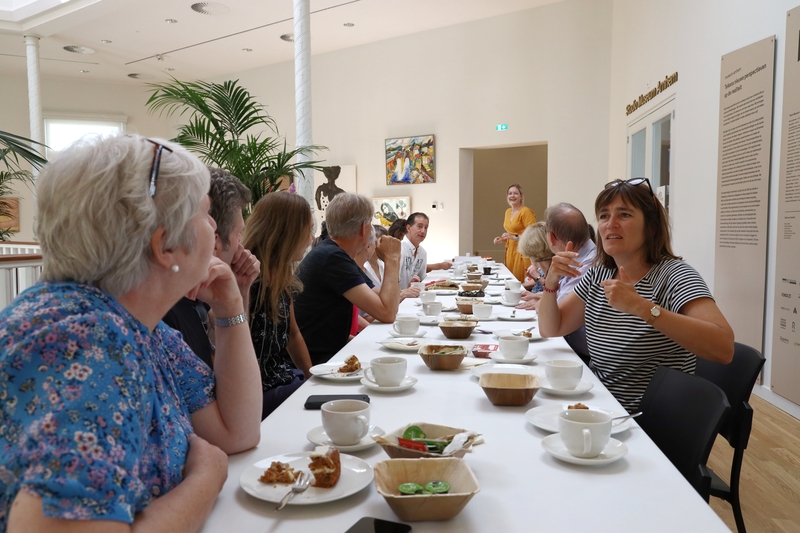
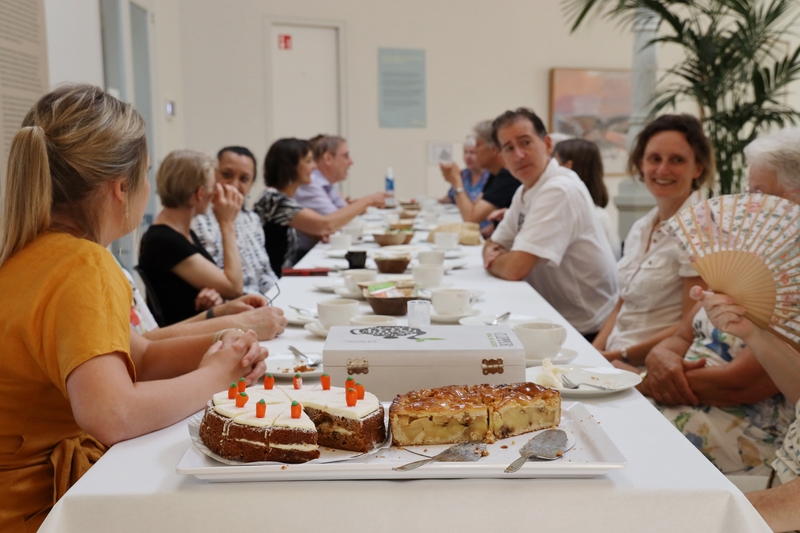
Catching up with each other again after a long time.
‘Just take a little fabric and make some art.’ The guide makes it sound so easy!
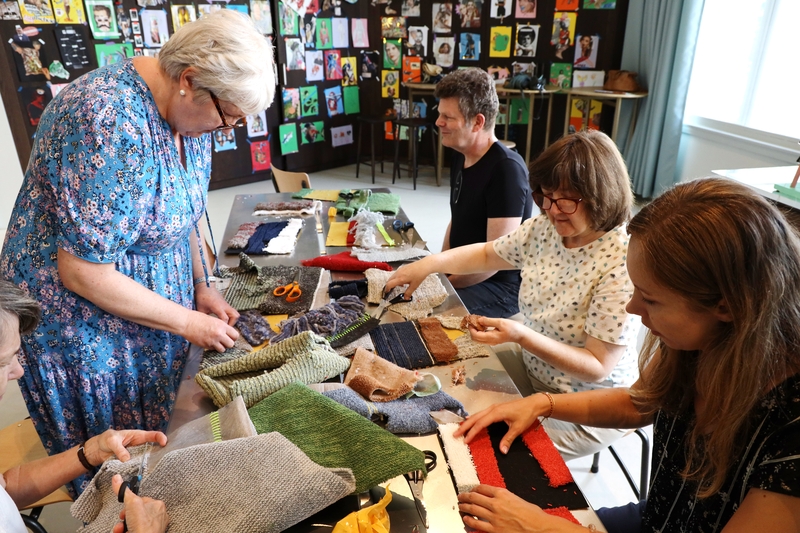
Hard at work during the creative workshop.
(Photos on this page by Hans van Bemmelen)

At the beginning of August, the sad news reached us that former SENSE member Paul Osborn had died. Paul was a larger-than-life character with a wealth of experience under his belt who described himself as a storyteller, listener, and observer. Mike Gould had the pleasure of interviewing him in 2020, and we share a summary of their conversation below.
You may know Paul Osborn from his somewhat cryptic contributions on the SENSE Forum. But have you perhaps wondered about the person behind these postings? I talked to him to find out about some of the more significant events in a rich working life.
Paul was born in London in 1948. He worked with Voluntary Service Overseas (VSO) teaching English in Algeria before studying social sciences at the University of Kent. The main theme in his life has been the global south or, in Paul’s words, pays en voie de développement. At the age of 23, he was writing on this topic for The Economist Intelligence Unit, and he also wrote (in French) for the magazine Jeune Afrique. Over the years, he has worked for Young Oxfam, the World Bank, the United Nations Association, the UN Food and Agriculture Organization, the International Labour Organization, Jamaica.gov and Spore, the bimonthly magazine of the Technical Centre for Agricultural and Rural Cooperation (CTA). He came to the Netherlands in 1976 and has been a member of SENSE since 2013.
Paul calls his company Mediateurs/DoingWedges. He explained why. The first part is easy: he has often played the role of mediator, including in the Northern Ireland peace process, in Eritrea and Indonesia. The wedges refer to the concept of climate stabilization wedges – 25-billion-tonne ‘wedges’ that need to be cut out of predicted future carbon emissions in the next 50 years to avoid a doubling of atmospheric carbon dioxide over pre-industrial levels.
Paul has been a media man and mediator since 1965, working on post-CO2 transitions, energy, finance, agriculture, technology upscaling, and storytelling. He has a reputation as an open, creative writer and filmmaker. The projects he is most proud of working on are the UPSCALE Safe Water Review, resulting in the 300in6 film Delivering Desire in 2012; the UN’s 1992 action plan for sustainable development entitled Agenda 21; The World Bank Sustainable Energy Report in 2004; the film Lighter Burden, Brighter Future – Energising Pacific Islands in 2008; Out of the Shadows: The Energy Transition of Indonesia in 2009; and a working group on Sex and Gender Equity in Research, resulting in a paper presented at the 2015 conference of the European Association of Science Editors (EASE).
Paul has close connections with a city that has been in the news a lot lately: Wuhan. Early in October 2004, Paul arrived in Wuhan. He was there to report on renewable energy in China, facilitated by the World Bank. He was met by the directors of leading Chinese assemblers of solar panels and batteries, as well as several minders, watchers and mediators. He later wrote a book for the World Bank and made films about a generic path towards renewable energy which were shown to millions of viewers on Chinese national television and BBC World.
Paul was also a supporter of social justice, particularly when it came to internet access. The World Wide Web Foundation’s ‘Contract for the Web’ was not launched until 2019. But back in 1984, when international NGOs from four continents formulated the Velletri Agreement at Interco to make a computer network that would support social justice activism, Paul commented, ‘The well-being of an individual – and a community – depends on their access to and ability to apply information.’ A sentence that sums up Paul’s lifelong concerns pretty well.



